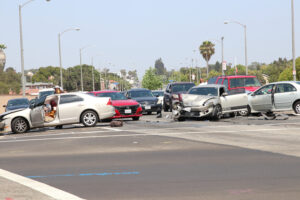“The most common injury from a rear-end collision isn’t a broken bone — it’s a strained neck.”
If you’ve ever been hit from behind in traffic, you might’ve brushed it off as minor. Just a small “fender bender”. No blood, no broken glass. Nothing but a little injury called “whiplash” — caused by the abrupt snap of the head forward and back. The problem is that this whiplash injury, properly called a “sprain/strain injury” — can set off a chain reaction inside your body that you don’t even feel right away.
According to the National Institute of Neurological Disorders and Stroke, around 2 million Americans suffer whiplash injuries each year. The main cause of these injuries are car crashes. That’s a staggering number. In Georgia, with its packed interstates like I-285 in the Atlanta area, or high-traffic routes like I-75/85 or I-20, these injuries are more common than most people think.
At Dan Chapman & Associates., we only handle personal injury cases. That focus means you get real experience on your side — not a generalist, but someone who knows this inside and out. If you’re dealing with symptoms of whiplash after a car accident, or even if you’re just not sure yet, this article will walk you through what to watch for, why it matters, and what you should do next.
Warning Signs of Whiplash
Whiplash doesn’t always hurt right away. You might feel fine at the scene, exchange information with the other driver and the police officer, and then drive home. No pain, no stiffness just anxiety from high adrenaline. You begin to calm down and then some few hours later, even a few days later, something feels off. The neck or back is stiff. There is pain when you look up or down or turn your head side to side. That delay is why whiplash is often missed or downplayed.
Here are the most common symptoms of whiplash from a car accident:
1. Neck pain and stiffness
This is the most classic symptom. The muscles and soft tissue in your neck strain beyond their normal range of motion. You may find it hard to look over your shoulder, tilt your head back, or sleep in certain positions.
2. Headaches
These often begin at the base of the skull and radiate toward your forehead. It’s one of the body’s warning signs that something’s not right. If the headache becomes persistent or sharp, it may indicate nerve or spinal involvement.
3. Reduced range of motion
Simple tasks — backing out of a driveway, tying your shoes, looking at your phone — can become difficult. The pain may increase with motion and subside at rest.
4. Shoulder, upper back, or arm pain
Whiplash can extend beyond your neck. The sudden motion affects nearby muscle groups, and the discomfort can travel. You might also notice swelling or tenderness in these areas.
5. Tingling or numbness
When whiplash affects the spinal nerves, you may feel pins and needles, burning, or even numbness in your arms or hands. That’s not just discomfort — it’s a sign that your nerves may be compressed or damaged.
6. Fatigue
Muscle strain takes a toll on your energy. Combined with poor sleep and pain, many people feel drained in the days after a crash.
7. Dizziness or blurred vision
Your neck plays a bigger role in balance and eye coordination than most people realize. When it’s injured, you might feel off-kilter, unsteady, or have trouble focusing your eyes.
8. Memory or concentration problems
In some cases, especially when there’s a mild concussion involved, people report foggy thinking, trouble remembering details, or feeling “off.”
Potential Complications Associated with Whiplash
Most whiplash injuries are temporary. But some evolve into long-term problems. This risk increases if you don’t get treatment early or if the impact was significant.
Here’s what can happen when whiplash from a car accident becomes more than a short-term issue:
Chronic Pain
According to a 2022 study published in the Journal of Orthopaedic & Sports Physical Therapy, up to 30% of whiplash patients go on to develop chronic neck pain. These cases often involve deeper soft tissue injury, disc herniation, or spinal joint damage.
Degenerative Disc Disease
Whiplash accelerates the wear and tear of spinal discs, especially in people over 40. You might not feel it at first, but years later, that untreated injury can contribute to disc degeneration and arthritis.
PTSD and Anxiety
It’s not just physical. Car collisions, especially high-speed ones on roads like I-20 through Conyers or the GA-400 near Sandy Springs, can trigger psychological responses. Some people avoid driving, have flashbacks, or experience panic attacks. These symptoms are often overlooked, but they’re very real.
Sleep Disorders
Pain, tension, and anxiety can make it difficult to fall asleep or stay asleep. Over time, sleep deprivation contributes to fatigue, poor healing, and mood swings.
Long-Term Disability
In extreme cases — especially when spinal nerves or discs are affected — whiplash can lead to mobility issues, ongoing medication needs, or even surgery. This is rare, but it happens.
Stroke
According to research from the American Stroke Association reported in Science Daily, “suffering a neck or head injury in a car accident increases the risk of a stroke as much as 3 times. Another study from Boston University found that patients over the age of 65 had an increased risk of stroke 1-6 months after being involved in a motor vehicle accident than they would have otherwise. A tear or injury to a carotid (neck) or vertebral (spine) artery can cause blood clots that can travel to the brain and cause a stroke. In fact, according to Johns Hopkins Children’s Center, this scenario causes 25% of all strokes in children. Unfortunately, whiplash from a car accident is exactly the kind of injury that can precipitate a tear in an artery.
The Importance of Seeking Medical Care After a Car Accident
You can’t see whiplash on an X-ray. That’s why having a physical exam and getting medical documentation matters so much.
Here’s why you should see a doctor immediately:
- Early diagnosis means better early treatment. Your physician can evaluate range of motion, refer you for physical therapy, or order imaging if needed.
- Symptoms may be delayed. Just because you feel okay right after the accident doesn’t mean you’re in the clear.
- Insurance companies look for gaps in treatment. Waiting too long can hurt your injury claim. A delay gives adjusters a reason to say your injuries came from something else.
- Medical records build your case. At Dan Chapman & Associates., we rely on your medical documentation to fight for your rights. Without it, your claim may be significantly weakened.
Even if you’re treated at the Piedmont Athens Regional, Emory Decatur, or a local urgent care in Gwinnett County, what matters is that your injury is evaluated and recorded by a licensed professional — and that you follow through with care.
Common Causes of Whiplash in Georgia
Not all car crashes are high-speed collisions. In fact, the majority of whiplash injuries occur at speeds under 15 mph. Here’s where we see it most often:
- Rear-end collisions on I-85 or I-75
- T-bone accidents at intersections in McDonough, Monroe, or Winder
- Stop-and-go traffic accidents on GA-316 or Buford Highway
- Low-speed collisions in parking lots — especially near shopping centers like Stonecrest Mall or Lenox Square
Even a minor fender-bender can jolt your head enough to cause whiplash. Don’t underestimate the impact just because your car doesn’t have visible damage.
When to Call a Lawyer About Whiplash
You don’t need to wait until your neck pain gets worse. If you’ve been in a car accident and have any symptoms of whiplash, or if a doctor diagnosed you with it, you may have a personal injury claim.
Here’s when you should talk to a lawyer:
- You missed work because of the injury
- You’re seeing a chiropractor, physical therapist, or specialist
- Your insurance company is minimizing your claim
- You were not at fault for the accident
- The other driver was uninsured or underinsured
Dan Chapman & Associates. helps clients in Atlanta, Macon, Athens, Lawrenceville, Covington, and across the state of Georgia recover compensation for medical bills, lost wages, and pain from whiplash and other personal injuries. This is all we do — no divorces, no contracts, no criminal cases. Just injury law.
What Compensation Can You Get for Whiplash from a Car Accident
You may be entitled to compensation for:
- Medical expenses (doctor visits, imaging, therapy)
- Lost wages if you couldn’t work
- Pain and suffering — including physical and emotional toll
- Future care costs if you need ongoing treatment
- Out-of-pocket costs like prescriptions, braces, or travel for appointments
We also pursue claims for loss of earning capacity if your injuries limit your future work ability. In some cases, clients have required long-term rehab, and we work closely with medical experts to quantify that loss.
Why Choose Dan Chapman & Associates.
Because we’re not distracted. We don’t handle dozens of different types of cases. We focus only on personal injury. That means you get a team that knows what insurance companies will argue, how to prove pain that doesn’t show up on a scan, and how to win full compensation.
We’ve handled whiplash cases from downtown Atlanta to suburban Roswell to rural Walton County. We know the hospitals, the insurers, and the court systems here in Georgia.
And we don’t get paid unless you do. Period.
Next Steps if You Think You Have Whiplash
Here’s what to do today:
- See a doctor — even if the pain is mild.
- Document everything — take notes about your symptoms.
- Call a personal injury lawyer — the sooner the better.
- Don’t speak to insurance adjusters without advice.
- Follow your treatment plan — skipping appointments hurts your case.
Call Dan Chapman & Associates
If you’re dealing with whiplash from a car accident in Georgia, don’t wait to get help. At Dan Chapman & Associates., our focus is 100% personal injury law — no distractions, no compromises. Whether you live in Decatur, Norcross, Conyers, or anywhere in Georgia, we’re ready to fight for your recovery.Call us now or fill out our quick online form to schedule a free consultation.






